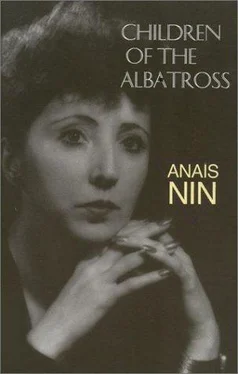Anaïs Nin - Children of the Albatross
Здесь есть возможность читать онлайн «Anaïs Nin - Children of the Albatross» весь текст электронной книги совершенно бесплатно (целиком полную версию без сокращений). В некоторых случаях можно слушать аудио, скачать через торрент в формате fb2 и присутствует краткое содержание. Год выпуска: 1959, ISBN: 1959, Издательство: Swallow Press, Жанр: Классическая проза, Эротические любовные романы, на английском языке. Описание произведения, (предисловие) а так же отзывы посетителей доступны на портале библиотеки ЛибКат.
- Название:Children of the Albatross
- Автор:
- Издательство:Swallow Press
- Жанр:
- Год:1959
- ISBN:9780804000390
- Рейтинг книги:4 / 5. Голосов: 1
-
Избранное:Добавить в избранное
- Отзывы:
-
Ваша оценка:
- 80
- 1
- 2
- 3
- 4
- 5
Children of the Albatross: краткое содержание, описание и аннотация
Предлагаем к чтению аннотацию, описание, краткое содержание или предисловие (зависит от того, что написал сам автор книги «Children of the Albatross»). Если вы не нашли необходимую информацию о книге — напишите в комментариях, мы постараемся отыскать её.
Children of the Albatross — читать онлайн бесплатно полную книгу (весь текст) целиком
Ниже представлен текст книги, разбитый по страницам. Система сохранения места последней прочитанной страницы, позволяет с удобством читать онлайн бесплатно книгу «Children of the Albatross», без необходимости каждый раз заново искать на чём Вы остановились. Поставьте закладку, и сможете в любой момент перейти на страницу, на которой закончили чтение.
Интервал:
Закладка:
But dive!
With large savage scissors he cut off all the moorings. Cut off responsibilities, families, shelters. He sent every one of them towards the open sea, into chaos, into poverty, into solitude, into storms.
t agv>
At first they bounced safely on the buoyant mattress of his enthusiasms. Jay became gayer and gayer as his timid passengers embarked on unfamiliar and tumultuous seas.
Some felt relieved to have been violated. There was no other way to open their beings. They were glad to have been done violence to as secrets have a way of corroding their containers. Others felt ravaged like invaded countries, felt hopelessly exhibited and ashamed of this lesser aspect of themselves.
As soon as Jay had emptied the person, and the bottle, of all it contained, down to the sediments, he was satiated.
Come, said Jay, display the worst in yourself. To laugh it is necessary to present a charade of our diminished states. To face the natural man, and the charm of his defects. Come, said Jay, let us share our flaws together. I do not believe in heroes. I believe in the natural man.
(I now know the secret of Jay’s well-being, thought Lillian. He does not care. That is his secret. He does not care! And I shall never learn this from him. I will never be able to feelas he does. I must run away from him. I will return to New York.)
And at this thought, the cord she had imagined tying her and Jay together for eternity, the cord of marriage, taut with incertitude, worn with anxiety, snapped, and she felt unmoored.
While he unmoored others, by cutting through the knots of responsibilities, he had inadvertently cut the binding, choking cord between them. From the moment she decided to sail away from him she felt elated.
All these tangled cords, from the first to the last, from the mother to the husband, to the children, and to Jay, all dissolved at once, and Jay was surprised to hear Lillian laugh in a different tone, for most times her laughter had a rusty quality which brought it closer to a sob, as if she had never determined which she intended to do.
At the same hour at the tip of the Observatory astronomers were tabulating mileage between planets, and just as Djuna had learned to measure such mileage by the oscillations of her heart (he is warm and near, he is remote and cool) from her first experience with Michael, past master in the art of creating distance between human beings, Michael himself arrived with Donald and she could see instantly that he was suffering from his full awareness of the impenetrable distance between himself and Donald, between himself and the world of adolescence he wanted to remain in forever and from which his lack of playfulness and recklessness barred him.
As soon as Michael saw Djuna’s eyes he had the feeling of being restored to visibility, as if by gazing into the clear mirrors of her compassion he were reincarnated, for the relentless work accomplished by Donald’s exclusion of him from his boyish world deprived him of his very existence.
Djuna needed only to say: Hello, Michael! for him to feel he was no longer a kindly protective ghost necessary to Donald’s existence. For Djuna saw him handsome, gifted in astronomy and mathematics, rich with many knowledges, eloquent when roperly warmed.
Hello, Michael! Djuna said, and the 100000000000000000000000000 miles between himself and human beings became like a small pencil addition on a note paper and not a state of being. They were laid aside like a student’s abstractions, and now he was sitting in a cafe and Donald at his right was merely a very beautiful boy of which there were so many, cut out like a clay pigeon at the fair, with only a facade, and that is what Djuna had called him from the very beginning (the first time she had said it he had been angry and brooded on the insufferable jealousy of woman). Hello, Michael! How is your clay pigeon today?
Such fine threads passed between Michael and Djuna. He could always seize the intermediary color of her mood. That was his charm, his quality, this fine incision from his knowledge of woman, this capacity for dealing in essences.
This love without possibility of incarnation which took place between Djuna and all the descendants of Michael, the lineage of these carriers of subtleties known only to men of his race.
They had found a territory which existed beyond sensual countries, and by a communion of swift words could charm each other actively in spite of the knowledge that this enchantment would have no ordinary culmination.
“Djuna,” said Michael, “I see all your thoughts running in all directions, like minnows.”
Then immediately he knew this in her was a symptom of anxiety, and he avoided the question which would have wounded her: “Has Paul’s father sent him to India?”
For in the way she sat there he knew she was awaiting a mortal blow.
At this moment there appeared on the marble-topped tables the stains of drink, the sediments and dregs of false beatitudes.
At this moment the organ grinder changed his tune, and ceased to shower the profligacies of Carmen.
The laughter of Pagliacci bleached by city fumes, wailed like a loon out of the organ, so that the monkey cornered by a joviality which had neither a sound of man or monkey rattled his chains in greater desperation and saluted with his red Turkish hat every stranger who might deliver him from this loud-speaker tree to which he had been tied.
He danced a pleading dance to be delivered from this tree from which the twisting of a handle brought forth black birds of corrugated melodies.
But as the pennies fell he remembered his responsibilities, his prayer for silent trees vanished from his eyes as he attempted a gesture of gratitude with his red Turkish hat.
Djuna walked back again into her labyrinthian cities of the interior.
Where music bears no titles flowing like a subterranean river carrying all the moods, sensations and impressions into dissolutions forming and reorming a world in terms of flow…
where houses wear but facades exposed to easy entrances and exits
where streets do not bear a name because they are the streets of secret sorrows
where the birds who sing are the birds of peace, the birds of paradise, the colored birds of desire which appear in our dreams
there are those who feared to be lost in this voyage without compass, barometers, steering wheel or encyclopedias
but Djuna knew that at this surrender of the self began a sinking into deeper layers of awareness deeper and deeper starting at the topsoil of gaiety and descending through the geological stairways carrying only the delicate weighing machine of the heart to weigh the imponderable
through these streets of secret sorrows in which the music was anonymous and people lost their identities to better be carried and swept back and forth through the years to find only the points of ecstasy…
registering only the dates and titles of emotion which alone enter the flesh and lodge themselves against the flux and loss of memory
that only the important dates of deep feeling may recur again and again each time anew through the wells, fountains and rivers of music…
Интервал:
Закладка:
Похожие книги на «Children of the Albatross»
Представляем Вашему вниманию похожие книги на «Children of the Albatross» списком для выбора. Мы отобрали схожую по названию и смыслу литературу в надежде предоставить читателям больше вариантов отыскать новые, интересные, ещё непрочитанные произведения.
Обсуждение, отзывы о книге «Children of the Albatross» и просто собственные мнения читателей. Оставьте ваши комментарии, напишите, что Вы думаете о произведении, его смысле или главных героях. Укажите что конкретно понравилось, а что нет, и почему Вы так считаете.












